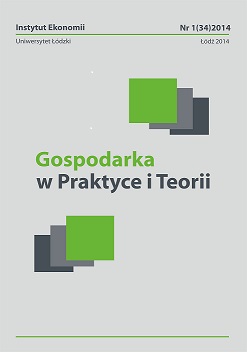The sooner the better. On the precision of responses to quantitative questions in surveys
DOI:
https://doi.org/10.18778/1429-3730.34.04Keywords:
quantitative research, survey, questionnaire, income, BAELAbstract
Questionnaire’s design, length, difficulty and general appeal may directly influence the quality of the collected data. I analyse the relationship between a survey’s length and the precision of acquired responses using Polish Labour Force Survey’s data on income distribution. I utilize a natural experiment of elongation of the LFS questionnaire that took place between the years 2005 and 2006 and measure the impact of this change on the distribution of the respondents’ declared earnings. The results of the performed tests indicate a significant, negative relationship between the length of the survey and the precision of the acquired data. The robustness of the results is discussed and conclusions are drawn.
References
Badanie Aktywności Ekonomicznej Ludności, dane: BAEL II kwartał 2005, BAEL II kwartał 2006.
Google Scholar
Dillman Don A., Michael D. Sinclair, Jon R., Clark Effects of Questionnaire Length, Respondent- Friendly Design, and a Difficult Question on Response Rates for Occupant-Addresed Census Mail Surveys, Public Opinion Quarterly, Vol. 57, No. 3, Oxford University Press on behalf of the American Association for Public Opinion Research 1993.
Google Scholar
DOI: https://doi.org/10.1086/269376
Krosnick Jon A., Duane F., Alwin An Evaluation of a Cognitive Theory of Response-Order Effects in Survey Measurement, Public Opinion Quarterly, Vol. 51, No. 2, The University of Chicago Press on behalf of the American Association for Public Opinion Research 1987.
Google Scholar
DOI: https://doi.org/10.1086/269029
Krosnick Jon A., Response Strategies for Coping with the Cognitive Demands of Attitude Measures in Surveys, Applied Cognitive Psychology, Vol. 5, John Wiley & Sons, Ltd. 1991.
Google Scholar
DOI: https://doi.org/10.1002/acp.2350050305
Krosnick Jon A., Stanley Presser, Question and Questionnaire Design, Handbook of Survey Research (2ed), James D. Wright and Peter V. Marsden (Eds). San Diego, CA: Elsevier 2009.
Google Scholar
Krosnick Jon A., Survey Research, Annual Review Psychology, Vol. 50, Annual Reviews 1999.
Google Scholar
DOI: https://doi.org/10.1146/annurev.psych.50.1.537
Lightspeed Research, Questionnaire Length [online], Lightspeed Research 2008, Dostępne: http:// www.lightspeedresearch.com/pdfs/Questionnaire_Length.pdf, [14 sierpień 2011]
Google Scholar
Mirta Galesic, Michael Bosnjak, Effect of Questionnaire Length on Participation and Indicators of Response Quality in a Web Survey, Public Opinion Quarterly, Vol. 73, No. 2, Oxford University Press2009.
Google Scholar
DOI: https://doi.org/10.1093/poq/nfp031
Polski Generalny Sondaż Społeczny, dane: PGSS 1992–1995, PGSS 1997/8
Google Scholar
Regula Herzog A., Jerald G., Bachman Effects of Questionnaire Length on Data Quality, Public Opinion Quarterly, Vol. 45, by the Trustees of Columbia University, Elsevier North-Holland, Inc. 1981.
Google Scholar
DOI: https://doi.org/10.1086/268687
Riphahn, Regina T., Oliver Serfling, Item Non-response on Income and Wealth Questions, Empirical Economics 30, 2005, No. 2.
Google Scholar
DOI: https://doi.org/10.1007/s00181-005-0247-7
Subar Amy F., Ziegler Regina G., Frances E. Thompson, Christine Cole Johnson, Joel L. Weissfeld, Douglas Reding, Katherine H. Kavounis, and Richard B. Hayes for the Prostate, Lung, Colorectal, and Ovarian Cancer Screening Trial Investigators, Is Shorter Always Better – Relative Importance of Questionnaire Length and Cognitive Ease on Response Rates and Data Quality for Two Dieatary Questionnnaires, American Journal of Epidemiology, Vol. 153, No. 4, The Johns Hopkins University School of Hygiene and Public Health 2001.
Google Scholar
DOI: https://doi.org/10.1093/aje/153.4.404
Thomas A. Heberlein, Robert Baumgartner Factors Affecting Response Rates to Mailed Questionnaires – A Quantitative Analysis of the Published Literature, American Sociological Review, Vol. 43, No. 4, American Sociological Association, 1978.
Google Scholar
DOI: https://doi.org/10.2307/2094771
World Institute for Development Economics Research of the United Nations University 2008, UNU -WIDER World Income Inequality Database [online], Version 2.0c, Dostępne: http://www. wider.unu.edu/research/Database/en_GB/database/, [15 sierpień 2011]
Google Scholar
Downloads
Published
How to Cite
Issue
Section
License
Copyright (c) 2014 Gospodarka w Praktyce i Teorii

This work is licensed under a Creative Commons Attribution-NonCommercial-NoDerivatives 4.0 International License.








